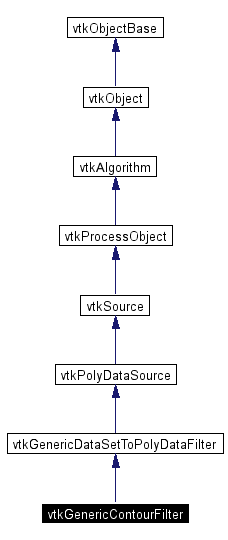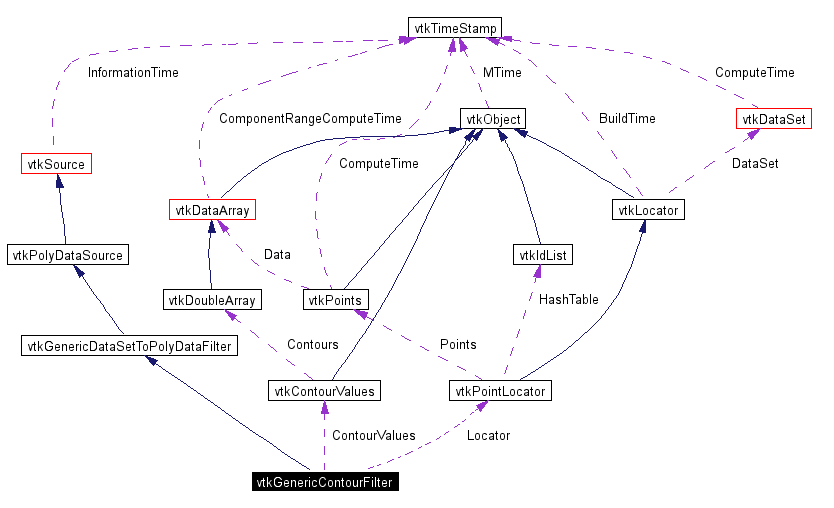vtkGenericContourFilter Class Reference
#include <vtkGenericContourFilter.h>
Inheritance diagram for vtkGenericContourFilter:
 [legend]
[legend]Collaboration diagram for vtkGenericContourFilter:
 [legend]List of all members.
[legend]List of all members.
Detailed Description
generate isocontours from input dataset
vtkGenericContourFilter is a filter that takes as input any (generic) dataset and generates on output isosurfaces and/or isolines. The exact form of the output depends upon the dimensionality of the input data. Data consisting of 3D cells will generate isosurfaces, data consisting of 2D cells will generate isolines, and data with 1D or 0D cells will generate isopoints. Combinations of output type are possible if the input dimension is mixed.
To use this filter you must specify one or more contour values. You can either use the method SetValue() to specify each contour value, or use GenerateValues() to generate a series of evenly spaced contours. It is also possible to accelerate the operation of this filter (at the cost of extra memory) by using a vtkScalarTree. A scalar tree is used to quickly locate cells that contain a contour surface. This is especially effective if multiple contours are being extracted. If you want to use a scalar tree, invoke the method UseScalarTreeOn().
This filter has been implemented to operate on generic datasets, rather than the typical vtkDataSet (and subclasses). vtkGenericDataSet is a more complex cousin of vtkDataSet, typically consisting of nonlinear, higher-order cells. To process this type of data, generic cells are automatically tessellated into linear cells prior to isocontouring.
- Warning:
- For unstructured data or structured grids, normals and gradients are not computed. Use vtkPolyDataNormals to compute the surface normals.
- See also:
- vtkContourFilter vtkGenericDataSet
- Created by:
-
- CVS contributions (if > 5%):
-
- CVS logs (CVSweb):
/GenericFiltering/vtkGenericContourFilter.h)/GenericFiltering/vtkGenericContourFilter.cxx)
- Tests:
- vtkGenericContourFilter (Tests)
Definition at line 72 of file vtkGenericContourFilter.h.
Member Typedef Documentation
Constructor & Destructor Documentation
| vtkGenericContourFilter::vtkGenericContourFilter |
( |
|
) |
[protected] |
|
Member Function Documentation
| virtual const char* vtkGenericContourFilter::GetClassName |
( |
|
) |
[virtual] |
|
| int vtkGenericContourFilter::IsTypeOf |
( |
const char * |
type |
) |
[static] |
|
|
|
Return 1 if this class type is the same type of (or a subclass of) the named class. Returns 0 otherwise. This method works in combination with vtkTypeRevisionMacro found in vtkSetGet.h.
Reimplemented from vtkGenericDataSetToPolyDataFilter. |
| virtual int vtkGenericContourFilter::IsA |
( |
const char * |
type |
) |
[virtual] |
|
|
|
Return 1 if this class is the same type of (or a subclass of) the named class. Returns 0 otherwise. This method works in combination with vtkTypeRevisionMacro found in vtkSetGet.h.
Reimplemented from vtkGenericDataSetToPolyDataFilter. |
| void vtkGenericContourFilter::PrintSelf |
( |
ostream & |
os, |
|
|
vtkIndent |
indent |
|
) |
[virtual] |
|
|
|
Methods invoked by print to print information about the object including superclasses. Typically not called by the user (use Print() instead) but used in the hierarchical print process to combine the output of several classes.
Reimplemented from vtkGenericDataSetToPolyDataFilter. |
|
|
Construct object with initial range (0,1) and single contour value of 0.0.
Reimplemented from vtkAlgorithm. |
| void vtkGenericContourFilter::SetValue |
( |
int |
i, |
|
|
float |
value |
|
) |
|
|
|
|
Methods to set / get contour values. |
| double vtkGenericContourFilter::GetValue |
( |
int |
i |
) |
|
|
|
|
Methods to set / get contour values. |
| double* vtkGenericContourFilter::GetValues |
( |
|
) |
|
|
|
|
Methods to set / get contour values. |
| void vtkGenericContourFilter::GetValues |
( |
double * |
contourValues |
) |
|
|
|
|
Methods to set / get contour values. |
| void vtkGenericContourFilter::SetNumberOfContours |
( |
int |
number |
) |
|
|
|
|
Methods to set / get contour values. |
| int vtkGenericContourFilter::GetNumberOfContours |
( |
|
) |
|
|
|
|
Methods to set / get contour values. |
| void vtkGenericContourFilter::GenerateValues |
( |
int |
numContours, |
|
|
double |
range[2] |
|
) |
|
|
|
|
Methods to set / get contour values. |
| void vtkGenericContourFilter::GenerateValues |
( |
int |
numContours, |
|
|
double |
rangeStart, |
|
|
double |
rangeEnd |
|
) |
|
|
|
|
Methods to set / get contour values. |
| unsigned long vtkGenericContourFilter::GetMTime |
( |
|
) |
[virtual] |
|
| virtual void vtkGenericContourFilter::SetComputeNormals |
( |
int |
|
) |
[virtual] |
|
|
|
Set/Get the computation of normals. Normal computation is fairly expensive in both time and storage. If the output data will be processed by filters that modify topology or geometry, it may be wise to turn Normals and Gradients off. |
| virtual int vtkGenericContourFilter::GetComputeNormals |
( |
|
) |
[virtual] |
|
|
|
Set/Get the computation of normals. Normal computation is fairly expensive in both time and storage. If the output data will be processed by filters that modify topology or geometry, it may be wise to turn Normals and Gradients off. |
| virtual void vtkGenericContourFilter::ComputeNormalsOn |
( |
|
) |
[virtual] |
|
|
|
Set/Get the computation of normals. Normal computation is fairly expensive in both time and storage. If the output data will be processed by filters that modify topology or geometry, it may be wise to turn Normals and Gradients off. |
| virtual void vtkGenericContourFilter::ComputeNormalsOff |
( |
|
) |
[virtual] |
|
|
|
Set/Get the computation of normals. Normal computation is fairly expensive in both time and storage. If the output data will be processed by filters that modify topology or geometry, it may be wise to turn Normals and Gradients off. |
| virtual void vtkGenericContourFilter::SetComputeGradients |
( |
int |
|
) |
[virtual] |
|
|
|
Set/Get the computation of gradients. Gradient computation is fairly expensive in both time and storage. Note that if ComputeNormals is on, gradients will have to be calculated, but will not be stored in the output dataset. If the output data will be processed by filters that modify topology or geometry, it may be wise to turn Normals and Gradients off. |
| virtual int vtkGenericContourFilter::GetComputeGradients |
( |
|
) |
[virtual] |
|
|
|
Set/Get the computation of gradients. Gradient computation is fairly expensive in both time and storage. Note that if ComputeNormals is on, gradients will have to be calculated, but will not be stored in the output dataset. If the output data will be processed by filters that modify topology or geometry, it may be wise to turn Normals and Gradients off. |
| virtual void vtkGenericContourFilter::ComputeGradientsOn |
( |
|
) |
[virtual] |
|
|
|
Set/Get the computation of gradients. Gradient computation is fairly expensive in both time and storage. Note that if ComputeNormals is on, gradients will have to be calculated, but will not be stored in the output dataset. If the output data will be processed by filters that modify topology or geometry, it may be wise to turn Normals and Gradients off. |
| virtual void vtkGenericContourFilter::ComputeGradientsOff |
( |
|
) |
[virtual] |
|
|
|
Set/Get the computation of gradients. Gradient computation is fairly expensive in both time and storage. Note that if ComputeNormals is on, gradients will have to be calculated, but will not be stored in the output dataset. If the output data will be processed by filters that modify topology or geometry, it may be wise to turn Normals and Gradients off. |
| virtual void vtkGenericContourFilter::SetComputeScalars |
( |
int |
|
) |
[virtual] |
|
|
|
Set/Get the computation of scalars. |
| virtual int vtkGenericContourFilter::GetComputeScalars |
( |
|
) |
[virtual] |
|
|
|
Set/Get the computation of scalars. |
| virtual void vtkGenericContourFilter::ComputeScalarsOn |
( |
|
) |
[virtual] |
|
|
|
Set/Get the computation of scalars. |
| virtual void vtkGenericContourFilter::ComputeScalarsOff |
( |
|
) |
[virtual] |
|
|
|
Set/Get the computation of scalars. |
|
|
Set / get a spatial locator for merging points. By default, an instance of vtkMergePoints is used. |
|
|
Set / get a spatial locator for merging points. By default, an instance of vtkMergePoints is used. |
| void vtkGenericContourFilter::CreateDefaultLocator |
( |
|
) |
|
|
|
|
Create default locator. Used to create one when none is specified. The locator is used to merge coincident points. |
| virtual char* vtkGenericContourFilter::GetInputScalarsSelection |
( |
|
) |
[virtual] |
|
|
|
If you want to contour by an arbitrary scalar attribute, then set its name here. By default this in NULL and the filter will use the active scalar array. |
| virtual void vtkGenericContourFilter::SelectInputScalars |
( |
const char * |
fieldName |
) |
[virtual] |
|
|
|
If you want to contour by an arbitrary scalar attribute, then set its name here. By default this in NULL and the filter will use the active scalar array. |
| void vtkGenericContourFilter::Execute |
( |
|
) |
[protected, virtual] |
|
|
|
This method is the old style execute method
Reimplemented from vtkSource. |
| virtual void vtkGenericContourFilter::SetInputScalarsSelection |
( |
const char * |
|
) |
[protected, virtual] |
|
Member Data Documentation
The documentation for this class was generated from the following file:

